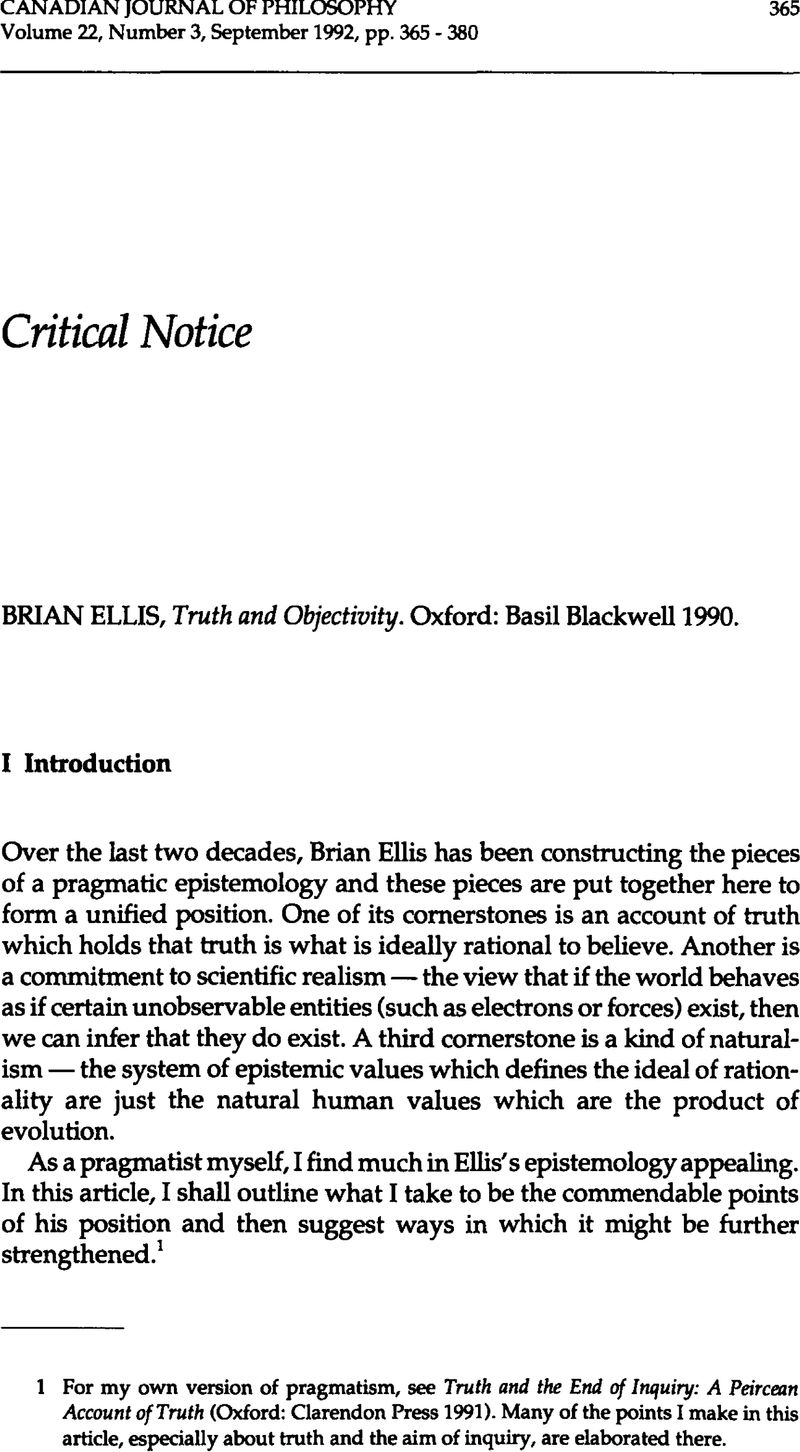No CrossRef data available.
Article contents
Brian Ellis Truth and Objectivity. Oxford: Basil Blackwell 1990.
Review products
Published online by Cambridge University Press: 01 January 2020
Abstract

- Type
- Critical Notice
- Information
- Copyright
- Copyright © The Authors 1922
References
1 For my own version of pragmatism, see Truth and the End of Inquiry: A Peircean Account of Truth (Oxford: Clarendon Press 1991). Many of the points I make in this article, especially about truth and the aim of inquiry, are elaborated there.
2 Correspondence theorists are subject to a skeptical challenge here. As Ellis says: ‘if truth is independent of our epistemic values, then we have no good reason to believe that those theories which we should judge to be the best are any nearer to the truth’ (271).
3 C.S. Peirce, The Charles S. Peirce Papeis (Cambridge, MA), MS 684, 11
4 See Misak (124) for this formulation of pragmatism.
5 He here follows Price, H. Facts and the Function of Truth (Oxford: Basil Blackwell 1988)Google Scholar here. Ellis says he intends his view to do both of these tasks (294) but does not tell us just how it manages this feat. I also claim to do both; see Misak, 35ff. and 126ff.
6 Peirce, C.S. Collected Papers of Charles Sanders Peirce, horne, C. Harts and Weiss, P. eds. (Cambridge, MA: Belknap Press), 5.423.Google Scholar
7 See my ‘Pragmatism and Bivalence,’ International Studies in the Philosophy of Science 4 (1990), for an elaboration of the points made in this section.
8 Thus pragmatism is not strongly ethnocentric― it insists that all cultures have their say. But it is weakly ethnocentric in that the beliefs which are true are those which would not be overturned by recalcitrant experience and argument. The pragmatist will bet that, for the most part, those would be the beliefs that Western science would produce. If the pragmatist makes coherence with evidence and argument the standard of rationality and truth, she stacks the deck in favor of those inquiries which take evidence and argument seriously.
9 Ellis seems to see this; he frequently grounds truth in human practices. See, for instance, 261, 266, 269, 287.
10 Ellis takes epistemic conservatism to be the principle that we ought to prefer beliefs about recognized kinds of things as opposed to generalizations about unrecognized kinds of things (245). He uses this principle to make short work of Goodman's new riddle of induction.
11 This is the search for necessary and sufficient conditions for effects we wish to explain (254).
12 This is the tendency to ‘generalize widely’ (260).
13 It is not clear whether Ellis intends that this ‘justification’ of our current epistemic practices to be grounded in evolution. He holds that ‘the most fundamental of our epistemic values are likely to be ones which have contributed significantly to our fitness to survive as members of tribes of social animals, which are in competition with other tribes, and with animals of other species, for scarce resources’ (262). Although he holds that our epistemic values are products of natural selection, he does not explicitly say that that makes them justified or objective.
14 Again, this view of inquiry is not completely naturalized or sanitized of normativity. In connecting truth with evidence and argument, the deck is stacked in favor of certain sorts of inquiry.
15 See my ‘Empiricism, Pragmatism, and Morality’ in Nature, Truth, and Value: Essays in Honour of David Wiggins (Oxford: Basil Blackwell forthcoming) for the application of the pragmatic account of truth to moral judgments.
16 If the identification of ideal rationality with the current standards of science is barred, it seems that Ellis must give up on something he takes to be most important ―the commitment to scientific realism. His ‘ontology is the kind of theory of reality one would expect a scientific realist to hold, for it is constructed on the assumption that currently accepted scientific accounts of the nature of reality are the best theories available’ (2). Scientific accounts may be the best accounts of reality available at present, but nothing warrants us to assume that they are the final word on reality. Nothing warrants the assumption that the ontology of the scientific realist is ideally rational or would be the best ontology were inquiry to run its course. So all that we are entitled to infer from ‘the world behaves as if x exists’ is that it is rational to believe that x exists. We cannot infer the stronger 'x exists.'
17 Evolution here is meant in a non-technical sense.


